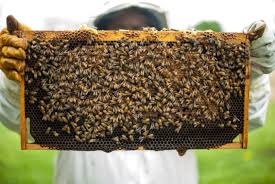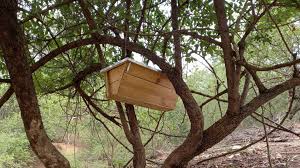
The Zimbabwean government is actively promoting rural community development through its Rural Development 8.0 initiative. This initiative prioritizes local solutions to address the changing climate and aims to transform the rural economy by focusing on value-added agriculture and enhancing food security.
In line with this national thrust, communities in the Makoni district of Manicaland Province are strengthening their climate resilience and sustaining livelihoods through beekeeping, thanks to the support of the locally-led organization “Working for Bees.”
Sandra Vasco, a 37-year-old woman beekeeper in Nyazura, Makoni district, exemplifies this success. She states that beekeeping has fostered a deep appreciation for nature, motivating her to actively conserve forestland while sustainably benefiting from it.
“Bees need forestland and nature for good pollination, which in turn allows us to benefit from the honey they produce. Over the past two years, we have intensified the planting of both indigenous and exotic trees and are actively preserving tree species. In return, we are seeing increased honey production,” Sandra explained.
Bees play a crucial role in conservation by aiding the regeneration of natural vegetation in degraded areas. Beekeepers, therefore, become stewards of their environment, ensuring the surrounding habitat, including nectar-rich forests, thrives to support their bees.
Sandra credits the training she and her fellow beekeepers received from “Working for Bees” as highly beneficial. “Twenty groups of community beekeepers in this district were trained, and we now have a better understanding of different bee types and their specific roles in honey production. We were also taught to construct beehives using locally available materials such as grass, mud, and logs. I started with just five hives and now harvest from over twenty.”
The low labor intensity of beekeeping is another significant advantage, according to Sandra. “I started this project with no capital, but I am now happily sustaining my family’s health, food, and educational needs through beekeeping. It’s empowering me as a rural woman, as I am earning over US$ 100 monthly.”
Furthermore, Sandra highlighted the increased profitability achieved through value addition. “After processing the honey, we are left with beeswax. We utilize this residue to produce candles, floor polish, shoe polish, and even skin lotion. We are also venturing into making honey wine.”

Dr. Robert Mutisi, the founder of “Working for Bees,” emphasized the sustainability of community-owned projects. “Projects thrive when communities are actively involved in their planning, implementation, and long-term management. This beekeeping project aligns with local needs, and the comprehensive training ensures its long-term viability.”
Dr. Mutisi also stressed the broader importance of protecting bees and promoting pollinator-friendly farming practices for global food system sustainability and food security.
Research indicates that a significant percentage of invertebrate pollinator species, particularly bees and butterflies, face threats from intensive monoculture and improper pesticide use, which diminish their food and nesting sites, expose them to harmful chemicals, and weaken their immune systems.
Highlighting a unique benefit of honey, Dr. Mutisi noted, “Honey is the only food that doesn’t expire; it can last for thousands of years without spoiling. This results in low post-harvest losses compared to other crops. Additionally, traceable and well-marketed honey can reach distant markets, offering lucrative returns.”
Zimbabwe’s National Development Strategy 1 for 2021-2025 (NDS I) recognizes the critical role of biodiversity in socio-economic development. The country aims to develop its biodiversity economy to contribute to its goals of achieving middle-income status by 2030 and pursuing a greener growth path.
To address the limited understanding of biodiversity’s value among stakeholders, Zimbabwe launched its Biodiversity Report in September 2023.
This report provides a framework for integrating the value and contribution of nature into development planning, policy formulation, and investment decisions in both the public and private sectors. The report was a collaborative effort between the Ministry of Environment, Climate and Wildlife and the African Wildlife Foundation (AWF).
